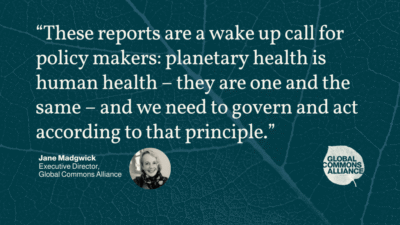IPBES: Tackle interlinked biodiversity, water, food, health and climate crises together
18/12/2024
3824
A new IPBES Nexus Report offers decision-makers the most ambitious scientific assessment ever undertaken of these complex interconnections and outlines specific response options to reduce harm and maximize co-benefits.
field_6565c1d2e42b8
The environmental, social and economic crises – including biodiversity loss, water and food insecurity, health risks and climate change – are all interconnected and must be tackled together, states a new report from Intergovernmental Platform on Biodiversity and Ecosystem Services (IPBES).
Published this week, the report offers decision-makers the most ambitious scientific assessment ever undertaken of these complex interconnections, and outlines specific response options to reduce harm and maximize co-benefits.
Known as the ‘Nexus Report’, the Assessment Report on the Interlinkages Among Biodiversity, Water, Food and Health from IPBES finds that existing actions to address these challenges fail to tackle the complexity of interlinked problems and result in inconsistent governance. The report was approved on Monday by the 11th session of the IPBES Plenary, which is made up of representatives from 147 government members of IPBES, and is the product of three years of work by 165 international experts.
The report also highlights the economic cost of failing to address the interlinked crises. More than half of global gross domestic product – over $50 trillion of annual economic activity around the world – is moderately to highly dependent on nature. “But current decision-making has prioritized short-term financial returns while ignoring costs to nature, and failed to hold actors to account for negative economic pressures on the natural world. It is estimated that the unaccounted-for costs of current approaches to economic activity – reflecting impacts on biodiversity, water, health and climate change, including from food production – are at least $10-25 trillion per year,” said Prof. McElwee, co-chair of the Assessment.

Jane Madgwick, Executive Director, the Global Commons Alliance, said: “The IPBES reports spotlight an underreported, and critical problem: the interconnected nature of the challenges facing humanity today. The reports show the urgent need for a transformation in policies and governance that puts the global commons at the heart of how we use water, grow our food, and build resilience to climate, biodiversity and health shocks. This needs to happen at all scales, across all sectors, and locally as well as globally.
“Thinking and acting in silos – as if biodiversity is disconnected from climate – only sets us up for failure. These reports are a wake up call for policy makers: planetary health is human health – they are one and the same – and we need to govern and act according to that principle.”
Get our newsletter
3165
a:3:{s:5:”title”;s:13:”Subscribe now”;s:3:”url”;s:45:”https://globalcommonsalliance.org/newsletter/”;s:6:”target”;s:0:””;}
a:2:{i:0;s:11:”a_wysiwyg_c”;i:1;s:5:”cta_c”;}
